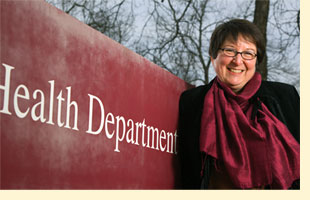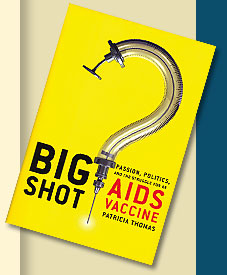Viewpoint
Training Black Belt Journalists
to Help Save Lives
It’s a sad day in these parts every fall when state-by-state health rankings are published, as nine of the 10 unhealthiest states are in the South. Georgia was among them for four years, but in 2007 it clambered up to 40th place.
That’s a step in the right direction. But compared with most states, Georgia still has too many newborns who die, too many children living in poverty, too few high-school graduates, too many people who smoke, eat, and drink excessively, and too many barriers to basic medical care.
Not everyone, of course, is equally affected. Although doctors’ offices no longer have separate white and colored waiting rooms, as they did during my small-town upbringing, being black is still bad for your health. And so is being poor, no matter the color of your skin.
 This is where journalism enters the picture. Although media professionals can’t eradicate poverty or racism, they do improve things. What people learn from television, newspapers, or the Internet can help them protect themselves against at least some assaults on their good health. News helps people make better choices, whether that means knowing where to go for a flu shot or when to visit the emergency room.
This is where journalism enters the picture. Although media professionals can’t eradicate poverty or racism, they do improve things. What people learn from television, newspapers, or the Internet can help them protect themselves against at least some assaults on their good health. News helps people make better choices, whether that means knowing where to go for a flu shot or when to visit the emergency room.
Press coverage also keeps health-care inequities on the public agenda, stimulating discussion about the moral and economic consequences of rationing care according to how much patients can pay, not how sick they are. But unless people read about limits on, say, children’s health insurance, most don’t ask how this could happen in the world’s richest nation.
In 2004, UGA’s Grady College of Journalism and Mass Communication won a new endowed chair in health and medical journalism from the John S. and James L. Knight Foundation. Other top schools applied, but Grady’s proposal rose to the top.
The mission of this Knight Chair is to help journalists—through research, teaching, and public service efforts—improve health knowledge in communities where people may not be able to afford the basic health care that ought to be their right. This challenge held enormous appeal for me because, no matter how long I lived “up North,” I knew that back home some of my high-school friends were already dead of premature heart disease and that old acquaintances with serious health problems were counting the days until they qualified for Medicare.
From the outset, I realized that not even a torrent of information could transform people of the Black Belt—impoverished Southern residents, as opposed to karate masters—into savvy self-care advocates overnight. Based on long experience as a reporter and editor, however, I had some ideas about how to at least turn on the spigot.
The Gnat Line News Briefing, an annual conference cosponsored by Grady College, brings Southern print and broadcast reporters together with top national journalists and experts on medicine, public health, and policy. This year, for example, faculty from the Odum School of Ecology will explain how human health is endangered by the declining quality of public water supplies.
Grady College has also launched an exciting new partnership with the ethnic news media flourishing in Metro-Atlanta and many smaller communities. Helping these organizations build reporting skills and tap into key news sources is crucial: if pandemic flu strikes, for example, everyone needs to know how to respond—not just people who read English.
On campus, the College’s new health and medical journalism concentration will enroll its first Master of Arts students in fall 2009. My goal is to educate young journalists who begin their first job with skills it took me years to learn. Although our graduates will be capable of working anywhere, we hope they’ll be motivated to pursue careers in the Black Belt that spans 11 Southern states.
All our health journalism initiatives are rooted in research, and my Grady College colleagues and I are making surprising discoveries about how reporters cover the health beat and where consumers seek health information. A recent phone survey of low-income households in Georgia and Alabama, for example, showed that newspapers are far from dead in small Southern towns. Confounding another stereotype, more than 50 percent of these households use computers, and almost all of them obtain health information online.
The more we learn as researchers, the more adept we’ll become at helping journalists empower people to act in their own best interests, whether at the dinner table, in the voting booth, or at a county commissioners meeting.
Woody Guthrie emblazoned on his guitars “This machine kills Fascists.” If we have as much faith in words as he had in music, graduates of our new health and medical journalism program may have stickers on their laptops that read: “This machine saves lives.”
Contact Patricia Thomas at: pthomas@grady.uga.edu
 |


